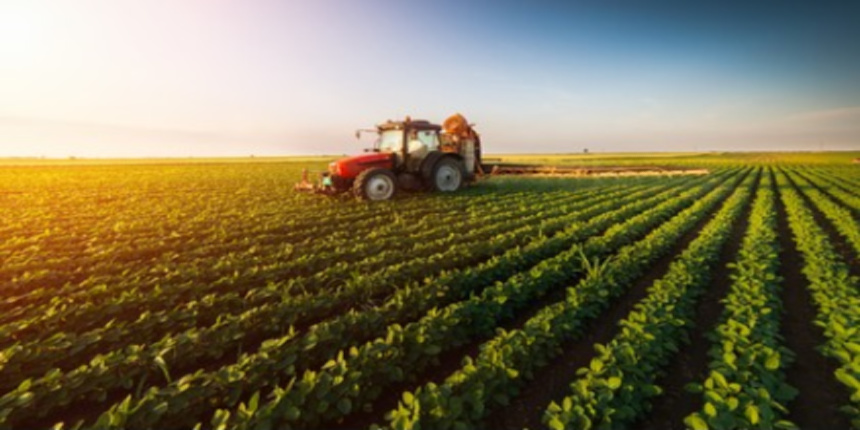Essay on Agriculture
Agriculture is one of the most commonly heard words. It’s the most vital practice for the survival of humans. Farmers are considered to be the backbone of agriculture and food production. The food we eat at home, the fruits and vegetables, have a long backstory to them, which in simpler words, can be attributed to agriculture. The following essay comprises fascinating insight into agriculture, its definition, the process and challenges, which can help you in your projects and assignments.
This Story also Contains
- 100 Word Essay on Agriculture
- 200 Word Essay on Agriculture
- 500 Word Essay on Agriculture

100 Word Essay on Agriculture
Agriculture is the art of practising soil cultivation, producing crops, and raising livestock. It involves the production of plants and animals for food, fibre, and other products. Agriculture plays a critical role in our lives for several reasons. Firstly, it provides food for people and animals. Without agriculture, we would not have access to the diverse and nutritious diet we enjoy today. Secondly, agriculture provides raw materials for various products, including clothing, medicine, and building materials.
The existence of humans would have been very critical if we hadn’t developed the practice of agriculture.
200 Word Essay on Agriculture
Agriculture refers to the process of cultivating crops for food, fuel, and other products. It is a crucial part of human civilisation, as it allows us to produce the food and essential items we need for survival.
Types Of Agriculture | The many types of agriculture range from small-scale subsistence farming to large-scale commercial operations. In subsistence farming, farmers grow enough food in small fields or house backyards to feed their families and may sell any excess produce at local markets. In commercial agriculture, farmers grow crops or raise animals on a larger scale, on larger pieces of land, to sell their products to large-scale consumers.
Impact Of Agriculture | Agriculture plays a vital role in the global economy, providing food and other products for people worldwide. It is also an important source of income and survival for many people, particularly in rural areas. However, agriculture can also have negative impacts on the environment. Some farming practices can lead to soil erosion, pollution, and biodiversity loss. As a result, sustainable agriculture has become the need of the hour in recent years, with farmers adopting practices that can help protect the environment while still producing the food we need.
500 Word Essay on Agriculture
Agriculture refers to cultivating land and raising crops or livestock for sustenance or commercial purposes. It is a crucial part of human civilisation, providing food, raw materials, and essential commodities that support communities and economies worldwide.
Origins of Agriculture
The origins of agriculture can be traced back to the Neolithic period when humans first began domesticating plants and animals. This marked a significant shift in human history as people transitioned from a nomadic lifestyle to a more settled one, with the development of permanent settlements and the growth of complex societies.
Challengeso of Agriculture
Today, agriculture remains a crucial industry, providing food and other products for a growing global population. However, agriculture also has its challenges. Farming can negatively impact the environment, as it involves the use of large amounts of water, pesticides, and other resources and even the negative impacts of climate change. Climate change is impacting agriculture significantly, with extreme weather events, such as droughts and floods, threatening crops and livestock.
What is Sustainable Agriculture?
Despite these challenges, agriculture continues to play a vital role worldwide. In recent years, there has been a focus on sustainable agriculture, which seeks to minimise the negative impact of farming on the environment while still providing food and other essential products for the global population.
My Visit to a Rice Farm
In July’ 22, I visited a rice farm with my family while we were on a trip to the wedding of one of our close relatives. The farm belonged to my uncle, he gave us a tour of it and explained to us about the art of cultivation of rice and the process of how the rice we eat at her home every other day is cultivated.
What I Learnt | I saw how the water system works in the fields, how much manure, supplements and insecticides are used to keep the crops healthy, and how the storage system works, and I got to explore a lot more about agriculture. I saw how the water system works in the fields, how much manure, supplements and insecticides are used to keep the crops healthy, and how the storage system works, and I got to explore a lot more about agriculture.
How I Felt | It was my first-time visit to the farm, and being a person who has spent all his life living in the city, I was extremely surprised at how peaceful the farm ambience is and how much effort, time and love goes into cultivating crops. We eat fruits and vegetables every day but don't realise how complex and effortful the process of agriculture is.
In conclusion, agriculture is an essential part of human civilisation, providing the food and raw materials that support communities and economies worldwide. While there are challenges to be addressed, such as the impact on the environment and the effects of climate change, agriculture remains crucial to humanity's well-being, survival and future.
Applications for Admissions are open.
As per latest syllabus. Physics formulas, equations, & laws of class 11 & 12th chapters
JEE Main Important Chemistry formulas
Get nowAs per latest syllabus. Chemistry formulas, equations, & laws of class 11 & 12th chapters
JEE Main high scoring chapters and topics
Get nowAs per latest 2024 syllabus. Study 40% syllabus and score upto 100% marks in JEE
JEE Main Important Mathematics Formulas
Get nowAs per latest syllabus. Maths formulas, equations, & theorems of class 11 & 12th chapters
